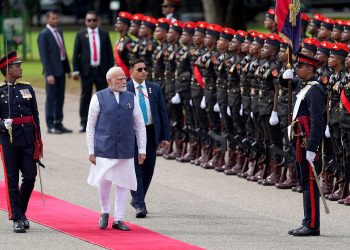Despite the rampaging rogue state across the Atlantic, around the cabinet table ministers push on with their plans. Too often ignored in all this sound and fury, there is some good news. This week Bridget Phillipson awarded the first 300 primary schools funding to set up nurseries that will add up to 4,000 places by the end of September. In the great dash for growth, growth, growth the OBR predicted an extra 0.2% of GDP due to the provision of free nursery hours for under twos, which are now coming on stream.
Nurseries may lack the glamour of mighty infrastructure projects, but the growth effect is immediate, letting more parents work, or work more hours. But the overriding motive of Labour’s early years push is to drive life chances of children whose future is too often determined long before they reach primary school.
Fulbridge Academy in Peterborough (which Phillipson visited earlier this week) is celebrating its grant of £150,000 to extend space for its nursery, raising numbers from 16 to 70 children in time for September. The head of school, Sam Smee, hopes for funding in time to raise this to 120 places, “so that all our children in reception can come through from places in our nursery, with no difficult transition, and we know all families right from the start”. He says four out of five deprived children who arrive in reception without attending nursery never catch up with the rest: “Even in year 6, it’s easy to recognise which children went through nursery from the start.” That’s no surprise, with voluminous evidence on the lifetime effect of good nurseries: the IFS, tracing children from the (mostly lost) Sure Start centres of the last Labour government, found children had fewer hospitalisations and better GCSE results.
This bright, spacious school, with extraordinary corridors decorated with fantasy scenes and woodlands, has room to expand. Nursery children attend forest school every week, and the advantage of being part of a large school means they are able to use the PE, sports, soft play, dance, drama, music and art teaching facilities used by the rest of the children. Maintained nurseries and nurseries within schools take considerably more Send children than those run mainly for profit: Fulbridge has 10% Send children in the nursery; the national average is 4.8%.
This is only the first tranche of new school-based nurseries, and there’s still a shortage. Coram Family and Childcare’s 24th annual Childcare Survey finds the extra free hours means a part-time nursery place for under-2s in England now costs 56% less than in 2024. But most councils – 79% – have enough places for at least three-quarters of their eligible nursery age children. “Nursery deserts” remain in the poorest areas, where it’s unprofitable for the private sector, so these first 300 chosen schools are mostly in the North and Midlands. Peterborough council tells me they will still be 200 places short next September.
There’s a waiting list of 20 children at Fulbridge, where 80% of the children have English as an additional language, half are of Pakistani heritage, with many others from eastern Europe. Thirty-two percent are on free school meals (24% is the national average), with a fifth living in multiple-occupancy housing and many families taking home food parcels provided at school by Fair Share. The breakfast club here has been free for a while, financed by Greggs, but the promised free breakfast clubs are rolled out to the first 750 schools this week, saving families £460 a year. In September every eligible child will get 30 free hours from nine months to age five, saving families an average £7,500 a year.
From when she was made shadow education secretary, Phillipson always said early years would come first, because every pound spent on the youngest makes the most difference to the rest of their education and their lives. She gave the biggest uplift so far in the early-years pupil premium for poor children. But she intends far more. After suffering six education secretaries in five years, (Gavin Williamson, remember him?), she has fixed a course that may take years to prove her success. It took 15 years before the IFS could prove what Sure Start did for GCSE results among poorer children. Labour says it has the patience, as with major infrastructure projects, housing and green energy. Growth – physical and human – takes time.
There is a very long way to go still to reverse the upside-down pyramid of education priorities, where more money is spent on a child where it makes least difference: nurseries add most human value, universities add least. Take that pupil premium – even with the uplift it’s worth just £388 for each poor nursery child but £1,480 for school-age deprived children. Why? Most nurseries don’t have trained teachers or graduates with thorough understanding in how to encourage development, speech and language, following the play-oriented early-years curriculum, which is very different from school teaching. (When I visited Sweden I found everyone working in a nursery is an early-years teaching graduate). Early vocabulary, oracy, expression, understanding, describing and reasoning should get the most intensive, skilled educators, not apprentices and the lowest paid in all education. The jumble of private providers need transforming into Fulbridge-style primary-linked nurseries.
But first, put right the shocking “eligibility” criteria for nursery hours. By far the most disadvantaged children have no working parent. They may be mentally or physically ill, they may be foreign speakers culturally barred from working, or not working for any number of good or bad reasons, but their children are the ones needing most help from the youngest age. Yet any child with no working parent is barred from full-time nursery: they get just 15 hours, not 30. And yes, says Smee, those missing 15 hours make the most difference to the children with the hardest family backgrounds. Why punish young children for their parent’s lack of work? Phillipson knows she has plenty more to do.
#celebrate #Labours #good #news #nurseries #bolder #Polly #Toynbee






















